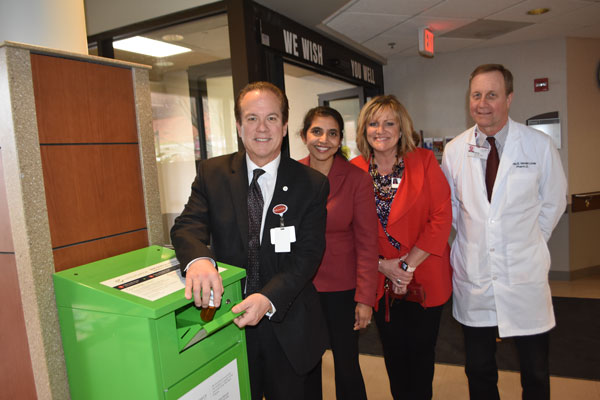St. Joseph Mercy Livingston implements Drug Takeback Program for unused household medications
January 26, 2020
Photo Caption: (From left to right) John O'Malley, president; Varsha Moudgal, MD, Associate Chief Medical Officer; Karla Zarb, Chief Nursing Officer; and James Vanderlinde, Manager of Pharmacy Services, stand in front of St. Joseph Mercy Livingston's new green receptacle, located in the main lobby of the hospital. The receptacle is part of a Drug Takeback Program that allows local residents to easily and anonymously dispose of unused medications.
HOWELL, Mich., January 27, 2020 – St. Joseph Mercy Livingston has placed a large green receptacle in its lobby for the easy and anonymous disposal of unused and out-of-date prescription and over-the counter medications, including pet medications. The receptacle, part of Saint Joseph Mercy Health System's medication take-back program in southeast Michigan, is intended to reduce the risk of accessible drugs in the home that can potentially harm children, teens or adults.
"As a trusted institution in the community, St. Joe's offers local residents a safe and convenient location to dispose of unused medications,” said John O'Malley, president of St. Joseph Mercy Livingston and the St. Joseph Mercy Brighton Health Center. “This program makes our community safer and protects our children from the dangers of unneeded medications in the home."
The large green receptacle is currently in place in the main lobby inside St. Joe's, located at 620 Byron Rd in Howell, Mich. Not accepted through the drug take-back program are illegal drugs, inhalers, lotions/liquids, aerosol cans, thermometers, needles, and hydrogen peroxide.
Unused medications in the home are a source of drug abuse in millions of homes, with the opioid crisis in the United States fueled in part by that availability: More than 83 percent of opioid prescription medications taken by new users are obtained from a friend, relative or others. Overall, 130 Americans die every day from a drug overdose.
The drug takeback program is in the process of being implemented at all five Saint Joseph Mercy Health System hospitals, located in Chelsea, Howell, Livonia, Pontiac and Ypsilanti. It is another element of the health system's efforts to reduce opioid use in southeast Michigan. Other initiatives include the creation of a Substance Use Disorder multi-disciplinary task force which provides clinician education, screening tools, 24/7 addiction medicine consult availability, guidelines for medication-assisted treatment and caring for IV drug users, multi-modal pain therapy and post-recovery exit strategy for opioid use.
In addition, the DisposeRX kit is available at no cost with opioid prescriptions filled at the retail pharmacies inside each of Saint Joseph Mercy Health System's hospitals. The DisposeRX solution renders the medication useless and allows it to be discarded in the trash in an environmentally safe manner.
St. Joe's partnered with Inmar to manage this drug takeback program. The company has a long history as the industry leader in handling prescription and over-the-counter drug returns safely, securely and discreetly for major and regional chain drug stores as well as independent pharmacies and hospitals across the United States.
# # #
About Saint Joseph Mercy Health System
Saint Joseph Mercy Health System (SJMHS) is a health care organization serving seven counties in southeast Michigan including Livingston, Washtenaw, Wayne, Oakland, Macomb, Jackson, and Lenawee. It includes 537-bed St. Joseph Mercy Ann Arbor, 443-bed St. Joseph Mercy Oakland in Pontiac, 304-bed St. Mary Mercy Livonia, 136-bed St. Joseph Mercy Livingston in Howell, and 133-bed St. Joseph Mercy Chelsea. Combined, the five hospitals are licensed for 1,553 beds, have five outpatient health centers, six urgent care facilities, more than 25 specialty centers; employ more than 13,400 individuals and have a medical staff of nearly 2,700 physicians. SJMHS has annual operating revenues of about $1.9 billion and returns about $120 million to its communities annually through charity care and community benefit programs.



